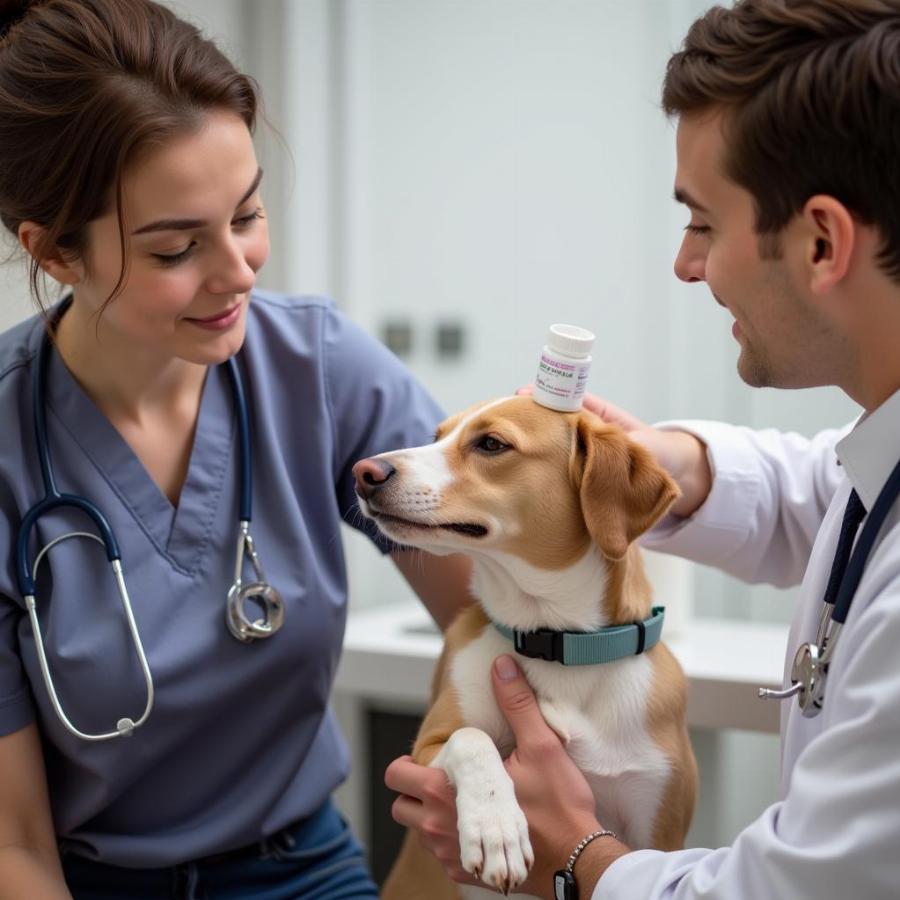Aspergillosis in dogs is a serious fungal infection caused by the Aspergillus mold, most commonly affecting their nasal passages, though it can also spread to other parts of the body. This guide will cover everything you need to know about aspergillosis in dogs, from the causes and symptoms to diagnosis, treatment, and prevention. Understanding this condition is vital for any dog owner, especially those with breeds prone to nasal infections.
What is Aspergillosis in Dogs?
Aspergillosis is primarily a respiratory disease, often beginning in the nasal passages and sinuses. The Aspergillus mold thrives in warm, moist environments and can be found in soil, decaying vegetation, and even dust. Dogs typically inhale the fungal spores, leading to the development of the infection. While any dog can contract aspergillosis, certain breeds with longer noses, such as German Shepherds, Doberman Pinschers, and Retrievers, seem to be more susceptible.
Recognizing the Symptoms of Aspergillosis
Early detection of aspergillosis is crucial for successful treatment. Be aware of these common symptoms:
- Nasal discharge: This can be thick, bloody, or contain pus.
- Sneezing: Frequent and forceful sneezing can be an indicator.
- Nosebleeds: Especially if they occur regularly.
- Facial swelling: Swelling around the nose or eyes.
- Pain: Your dog may exhibit signs of pain when touched around the nose.
- Lethargy and decreased appetite: These can be general signs of illness.
Diagnosing Aspergillosis: What to Expect
If you suspect your dog has aspergillosis, consult your veterinarian immediately. The diagnosis process typically involves:
- Physical examination: Assessing the dog’s overall health and examining the nasal passages.
- Rhinoscopy: A procedure using a small camera to view the inside of the nasal passages.
- Fungal culture: Taking a sample of nasal discharge to identify the presence of Aspergillus.
- Imaging tests (CT or MRI): These can provide detailed images of the affected area and help determine the extent of the infection.
Treatment Options for Aspergillosis in Dogs
Treatment for aspergillosis typically involves antifungal medications, often administered directly into the nasal passages. The duration of treatment can vary depending on the severity of the infection. In some cases, surgery may be necessary to remove infected tissue. anti fungal for dogs are vital in controlling the infection. Your vet will determine the best course of action based on your dog’s individual needs. antifungal medication for dogs come in various forms, including oral and topical.
 Điều trị Aspergillosis bằng thuốc chống nấm
Điều trị Aspergillosis bằng thuốc chống nấm
Preventing Aspergillosis: Protecting Your Dog
While complete prevention is challenging, minimizing exposure to potential sources of Aspergillus mold can help:
- Avoid areas with decaying vegetation or compost piles.
- Minimize dust in your home.
- Ensure adequate ventilation in your home.
How is Aspergillosis diagnosed in dogs?
Veterinarians will use a combination of physical examination, rhinoscopy, fungal culture, and imaging tests like CT scans or MRIs to definitively diagnose aspergillosis.
What are the long-term effects of Aspergillosis in dogs if left untreated?
Untreated aspergillosis can lead to severe complications, including bone destruction in the nasal passages, blindness, and even spread to other organs, potentially becoming life-threatening.
“Early diagnosis and aggressive treatment are key to managing aspergillosis,” explains Dr. Emily Carter, DVM, a renowned veterinary specialist in respiratory diseases. “Prompt intervention can significantly improve the outcome and prevent long-term complications.”
“Regular checkups with your veterinarian are crucial for maintaining your dog’s health and identifying any potential issues early on,” adds Dr. Michael Davis, DVM, a leading expert in canine fungal infections. fungal infection in dogs nose can be particularly challenging to diagnose without proper veterinary care.
Conclusion
Aspergillosis in dogs is a serious condition that requires immediate veterinary attention. Early diagnosis and treatment are critical for a positive outcome. By understanding the symptoms, diagnosis, and treatment options, you can be prepared to protect your furry friend from this potentially devastating fungal infection. If you notice any signs of aspergillosis in your dog, don’t delay – seek veterinary care as soon as possible. antifungal for dogs is often necessary to combat this infection effectively. If your dog has runny nose, it’s always best to consult a vet.
Beaut Dogs is your trusted source for comprehensive information on dog breeds and care. We provide valuable insights into the fascinating world of dogs, empowering owners to make informed decisions about their pets’ well-being. For expert advice and answers to your questions, contact us at [email protected]. Visit Beaut Dogs today!